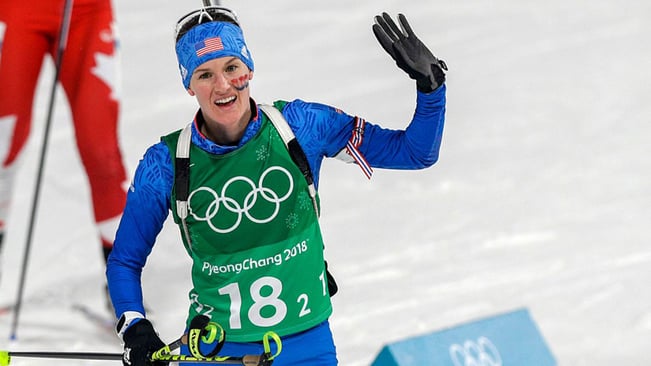
Photo credit: AP Photo/Gregorio Borgia
Watch a full interview with Clare on Parity's YouTube!
Clare Egan, 2x Olympian and current International Biathlon Union board member, is ready for the 2022 Winter Olympic Games. The 34-year-old Maine native sat down with Parity ahead of traveling to Beijing.
First things first, biathlon involves two events that require seemingly opposite skill sets: cross-country skiing and rifle shooting. How did you learn to master both?
I started out as a cross-country skier but becoming a biathlete was still a very difficult transition for me. The physical learning of precision shooting wasn't the hard part. What was really challenging was developing the psychological skills because they were so different from anything I'd had experience with before.
Because of my years in cross-country skiing, and before that track and field, I had already developed that fighting spirit - the drive to push yourself mentally and push your body physically to go faster and catch the person in front of you. With shooting, right away you realize that the same fighting spirit to win does not help you. In fact, it hurts you. It makes you nervous, it makes you focus on the outcome and takes you out of the moment. You need to tune out everything and only focus on the task at hand.
It's really challenging to shift your thinking between the two [events]. In cross-country skiing, my focus is on catching the person in front of me in order to win. In rifle shooting, I have to pretend none of that exists and just hit the target.
With such a steep learning curve, how did you maintain such strong mental fortitude?
Our sport is uniquely volatile in terms of results. In other sports, while not every person hits their PR every time, you can go into a competition sort of thinking that you know the range of times you’re very likely to make. That's not how it works in biathlon. We have the skiing part, which does work like that for the most part, but what really changes our results is the shooting component. If you have the best course time on skis but you miss two [targets], that puts you almost a minute back. For each miss, we have to do a 25-second penalty loop. We very often have someone place like 90th one day and then win the next.
In any given season, we have so many different people from so many different nations on the podium. It's not like, just because you're a great biathlete you're guaranteed to win a medal at the Olympics. The resilience to deal with the crazy ups and downs in this sport takes practice.
What is one of your favorite aspects of being a biathlete?
Biathlon is one of the biggest spectator sports in Europe. We’re on primetime TV three days a week. We typically have full stadiums, 20,000-30,000 people in the stands, plus the entire course outside would be lined with people. It’s been hard the past couple of years due to the pandemic; we have really been missing spectators. I love the fan component of putting on a show and seeing how happy and loud the fans are. I’ve missed that.
What does your training routine look like on any given day?
I typically go for a short run in the morning to wake up my body and mind. I then do my college cross-country warm up exercises! So, I’m on the side of the road in Germany or wherever I am, doing plyometrics and dynamic stretching.
One thing that’s pretty common for biathletes to do in training is dry firing, which is practicing getting into position and shooting, but without any ammunition. Unfortunately we won’t be able to do that in Beijing because we won’t have access to our rifles outside the stadium, which is a change in the routine but, we might be able to go to the venue early and do some.
How are you feeling heading into this Olympic Games compared to how you felt in 2018?
I’m so much more confident in my shooting. I’ve been shooting for eight years now, instead of four like in Pyeongchang. I was so focused on making the Olympic team back then and I did not have a growth mindset. What I mean by that is any time you’re focused on qualifying for something, it can very easily lead you to focus on a minimum standard that you have to meet. Now I approach [making a team] thinking, “How good can I be at this?” Adopting a growth mindset was a game changer for me.
You’re in the final year of your term as Athletes' Advisory Committee (AAC) chair and representative on the International Biathlon Union board. What changes have you noticed in the sport since you started?
My position didn't exist prior to 2018. There wasn't an athlete's voice in the boardroom. A number of controversies led to an all new leadership team coming in and creating the AAC chair role to have voting rights on the board.
I would say the team’s first priority was to restore good governance within the organization. That included things like transparency, integrity, sustainability, gender equality, and overall being an organization that we can be proud to be part of.
The IBU has a gender equality policy that lays out certain things such as minimum quotas for both genders within decision-making bodies. They're also doing a ton of mentorship and education among women coaches and officials, because that's one place where our sport lacks gender equality.
We are really lucky in that our actual athlete experience is very equal from a gender perspective. We have equal prize money, TV time, fans, and we compete on the same day and in the same stadium. There's no difference from my perspective, and I'm so grateful for that.
What advice would you give someone in the U.S., who may not be as familiar with your sport or may feel intimidated, who wants to get involved?
One thing that I tell younger people is that you can definitely do this. I never, ever, ever thought that I would be a professional athlete or an Olympian. I didn’t even think that until I was in my late twenties.
You have to work really hard but the great thing about our sport is that if you lack in certain areas, you can make up for it in others. People can succeed in so many different ways in biathlon and every body type is represented. Paralympic biathlon is also great - it’s not just for able-bodied athletes. Our sport is for everybody and every body.
Fans can watch Clare at the 2022 Beijing Winter Olympic Games starting on February 5 in the Mixed 4x6 Relay. Women's biathlon competition will continue through February 19. Find full schedule and broadcast info on Peacock TV. Follow Clare on Instagram and Twitter.
This interview has been edited and condensed for clarity.

